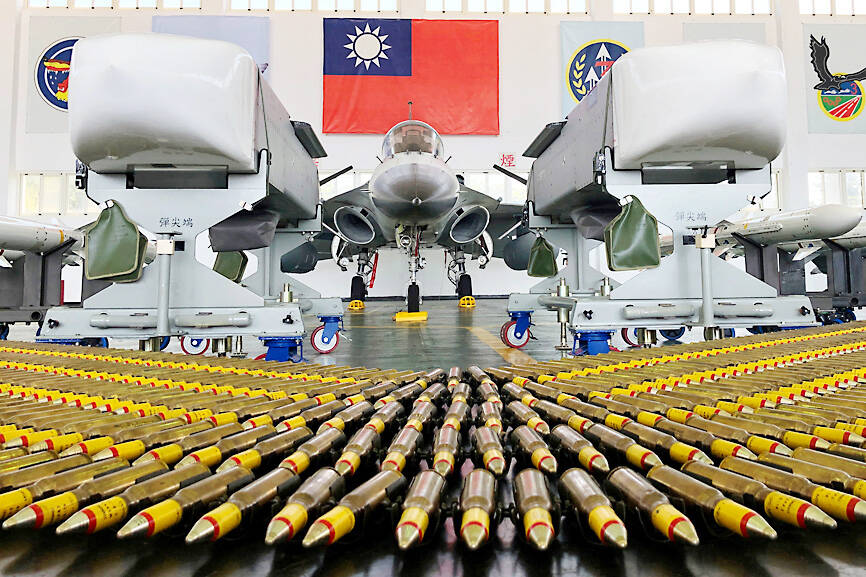The Presidential Office, the Ministry of National Defense and the Ministry of Foreign Affairs yesterday thanked the US for approving a US$500 million arms sale package to Taiwan on Wednesday.
The US Department of State approved the sale of F-16 Infrared Search and Track systems and related equipment for an estimated cost of US$500 million, the US Defense Security Cooperation Agency said in a press release.
The agency delivered certification notifying the US Congress of the sale on the same day, it said.

Photo: Yimou Lee, Reuters
“This proposed sale serves US national, economic and security interests by supporting the recipient’s continuing efforts to modernize its armed forces and to maintain a credible defensive capability,” it said.
The sale can help improve Taiwan’s security and maintain regional political stability, military balance and economic progress, it said.
In Taipei yesterday, the Ministry of National Defense said that the sale, which is expected to take effect in one month, would bolster the ability of its fleet of F-16s to detect and track long-distance targets, and greatly enhance the effectiveness of air combat.
The foreign ministry thanked the US government for continuing to help the nation to improve its self-defense capabilities in accordance with the Taiwan Relations Act and the “six assurances.”
This is the 11th arms sale approved by the administration of US President Joe Biden, which has continued its policy of normalizing arms sales to Taiwan and demonstrated that it considers Taiwan’s defense needs a high priority, the foreign ministry said.
Taiwan will continue to demonstrate its self-defense determination, strengthen the national defense force and safeguard national security and interests, Presidential Office spokeswoman Olivia Lin (林聿禪) said.
It will also continue to deepen its security partnership with the US, as well as cooperate with like-minded countries to jointly safeguard peace, stability and prosperity in the Taiwan Strait and the Indo-Pacific region, Lin said.
Meanwhile, the Executive Yuan approved a NT$440.6 billion (US$13.86 billion) national defense budget — or about 2.5 percent of GDP — as part of the proposed general budget for next year, the Cabinet told a post-meeting news conference.
The figure would be a year-on-year increase of 7.7 percent, or NT$31.4 billion, Cabinet officials said.
If the NT$94.3 billion special budget for obtaining new fighter jets and missiles are included, total military expenditure would rise to NT$543.9 billion, an annual increase of 3.3 percent, or NT$17.4 billion, they said.
Adding NT$71.9 billion in nonprofit special funds, national defense spending for next year would rise to NT$606.8 billion, an increase of NT$31.4 billion from this year, officials said.
Excluding all special budget items, non-profit and for-profit special funds and other unlisted expenditures, the nation’s military spending would comprise 15 percent of the general budget, or NT$431.2 billion, they said.
If the Legislative Yuan passes the budget, it would mean that defense expenditure would have increased 38 percent since President Tsai Ing-wen (蔡英文) took office eight years ago, Premier Chen Chien-jen (陳建仁) told reporters.
According to the Directorate-General of Budget, Accounting and Statistics, next year’s proposed national defense budget includes NT$130.6 billion in military investments and NT$179 billion in personnel costs.

CHAOS: Iranians took to the streets playing celebratory music after reports of Khamenei’s death on Saturday, while mourners also gathered in Tehran yesterday Iranian Supreme Leader Ayatollah Ali Khamenei was killed in a major attack on Iran launched by Israel and the US, throwing the future of the Islamic republic into doubt and raising the risk of regional instability. Iranian state television and the state-run IRNA news agency announced the 86-year-old’s death early yesterday. US President Donald Trump said it gave Iranians their “greatest chance” to “take back” their country. The announcements came after a joint US and Israeli aerial bombardment that targeted Iranian military and governmental sites. Trump said the “heavy and pinpoint bombing” would continue through the week or as long

TRUST: The KMT said it respected the US’ timing and considerations, and hoped it would continue to honor its commitments to helping Taiwan bolster its defenses and deterrence US President Donald Trump is delaying a multibillion-dollar arms sale to Taiwan to ensure his visit to Beijing is successful, a New York Times report said. The weapons sales package has stalled in the US Department of State, the report said, citing US officials it did not identify. The White House has told agencies not to push forward ahead of Trump’s meeting with Chinese President Xi Jinping (習近平), it said. The two last month held a phone call to discuss trade and geopolitical flashpoints ahead of the summit. Xi raised the Taiwan issue and urged the US to handle arms sales to

BIG SPENDERS: Foreign investors bought the most Taiwan equities since 2005, signaling confidence that an AI boom would continue to benefit chipmakers Taiwan Semiconductor Manufacturing Co’s (TSMC, 台積電) market capitalization swelled to US$2 trillion for the first time following a 4.25 percent rally in its American depositary receipts (ADR) overnight, putting the world’s biggest contract chipmaker sixth on the list of the world’s biggest companies by market capitalization, just behind Amazon.com Inc. The site CompaniesMarketcap.com ranked TSMC ahead of Saudi Aramco and Meta Platforms Inc. The Taiwanese company’s ADRs on Tuesday surged to US$385.75 on the New York Stock Exchange, as strong demand for artificial intelligence (AI) applications led to chip supply constraints and boost revenue growth to record-breaking levels. Each TSMC ADR represents

Pro-democracy media tycoon Jimmy Lai’s (黎智英) fraud conviction and prison sentence were yesterday overturned by a Hong Kong court, in a surprise legal decision that comes soon after Lai was jailed for 20 years on a separate national security charge. Judges Jeremy Poon (潘兆初), Anthea Pang (彭寶琴) and Derek Pang (彭偉昌) said in the judgement that they allowed the appeal from Lai, and another defendant in the case, to proceed, as a lower court judge had “erred.” “The Court of Appeal gave them leave to appeal against their conviction, allowed their appeals, quashed the convictions and set aside the sentences,” the judges